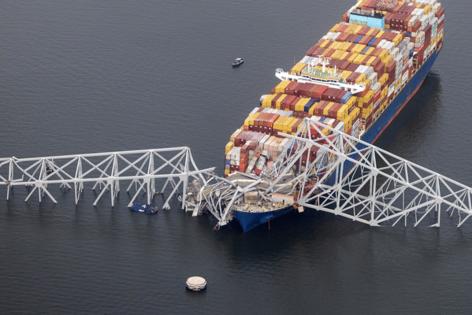Baltimore bridge collapse reverberates from cars to coal
Published in News & Features
The 1.6-mile-long bridge collapsed in a matter of seconds. The catastrophic consequences are set to stretch out for weeks.
As much as 2.5 million tons of coal, hundreds of cars made by Ford Motor Co. and General Motors Co., and lumber and gypsum are threatened with disruption after the container ship Dali slammed into and brought down Baltimore’s Francis Scott Key Bridge in the early hours of Tuesday.
Six people were presumed dead after a search in the Patapsco River, officials said. The toll could have been far worse except for a mayday call from the Singaporean-flagged vessel as it lost power.
The aftermath of the bridge’s collapse throws another spotlight on the fragile nature of global supply chains that have already been strained by drought in Panama and missile attacks on Red Sea shipping by Yemen-based Houthi militants. Docks in New Jersey and Virginia face the threat of being overwhelmed by traffic that’s being forced away from Baltimore, one of the busiest ports on the U.S. East Coast.
“It’s a large port with a lot of flow through it, so it’s going to have an impact,” John Lawler, Ford’s chief financial officer, told Bloomberg TV. “We’ll work on the workarounds. We’ll have to divert parts to other ports along the East Coast or elsewhere in the country.”
Baltimore handled only about 3% of all East Coast and Gulf Coast imports in the year through Jan. 31, said S&P Global Market Intelligence. But it’s crucial to cars and light trucks, with European carmakers such as Mercedes-Benz Group AG, Volkswagen AG and BMW operating facilities in and around the port. It’s also the second-largest terminal for U.S. exports of coal, with a shutdown potentially hitting shipments to India.
About a dozen large vessels are stuck inside Baltimore’s harbor as well as a similar number of tug boats, according to IHS Markit and Wood Mackenzie’s Genscape. The list includes cargo ships, automobile carriers and a tanker named the Palanca Rio.
That’s just the impact on the port.
About 35,000 people used the bridge every day. The annual value of goods going over is about $28 billion, according to the American Trucking Associations.
“We rely on our infrastructure systems for our daily needs, for a huge amount of the goods that we get in the United States from overseas and to have it cut off so suddenly, it’s a huge crisis,” said Yonah Freemark, a researcher at the Urban Institute.
...continued
©2024 Bloomberg L.P. Visit bloomberg.com. Distributed by Tribune Content Agency, LLC.







Comments